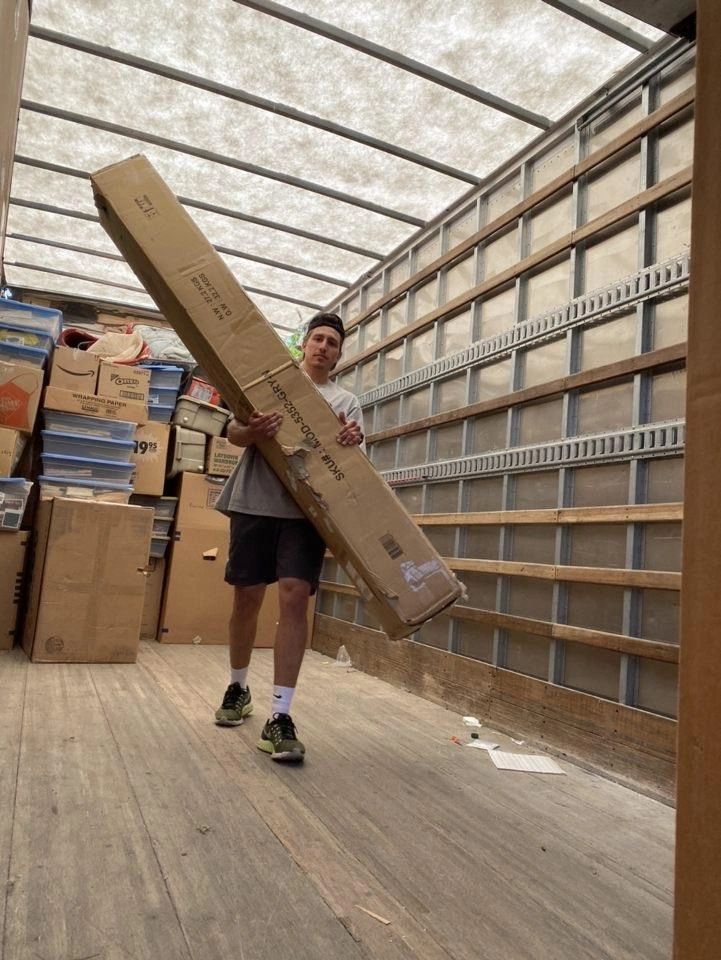Understanding the Inclusions of moving and Freight Forwarding worldwide of Worldwide and domestic Shipping
Guiding through the intricacies of moving and Freight forwarding can be difficult. Both processes include distinct treatments and needs that are vital for successful transport. Recognizing the differences in logistics, paperwork, and threat administration is necessary for individuals and companies alike. This understanding can significantly impact the performance and safety of deliveries. However, several are not aware of the certain parts that influence the general experience and results. What elements should one take into consideration to assure a smooth transition?
The Basics of moving and Freight Forwarding
moving and Freight forwarding are fundamental components of the international logistics sector. They help with the transfer of items and individual valuables throughout global and domestic boundaries. moving mainly entails the moving of families or people, including residential and commercial needs. It generally consists of packing, loading, transferring, and unloading products at the destination. On the other hand, Freight forwarding is concentrated on the delivery of goods, frequently wholesale, utilizing different transport modes, such as sea, land.freight, or air forwarders serve as intermediaries, coordinating logistics to assure prompt delivery while navigating with complex guidelines and personalizeds treatments. Both processes call for careful planning, organization, and interaction to guarantee effectiveness and decrease disruptions. Understanding these basics is crucial for any person involved in logistics, as they lay the groundwork for advanced aspects of shipping and transport management.
Key Components of Freight Forwarding Solutions
Freight forwarding solutions incorporate several crucial elements that assure smooth transportation of products. Trick duties of Freight forwarders include taking care of logistics, collaborating shipments, and managing customs clearance. Furthermore, recognizing vital shipping paperwork is essential for compliance and effective activity of freight.
Freight Forwarder Responsibilities
A dependable Freight forwarder plays a crucial duty in working with the transport of items, ensuring that shipments are taken care of efficiently and in compliance with regulations. Their responsibilities include different crucial tasks, including choosing ideal transportation routes, negotiating Freight prices, and managing logistics. They function as intermediaries in between providers and carriers, making certain that freight is correctly packaged and classified for risk-free transit. In addition, Freight forwarders track deliveries, providing updates to clients concerning the standing and anticipated delivery times. They also analyze and manage risks connected with transport, suggesting insurance choices as required. By assisting in interaction and paperwork, Freight forwarders streamline the delivery process, lowering prospective hold-ups and enhancing total supply chain performance.
Delivering Documentation Basics

Comprehending Custom-mades Clearance and Documents
Precise documents is important in the personalizeds clearance process, as it guarantees conformity with different laws. An overview of custom-mades laws highlights the intricacies dealt with by carriers and Freight forwarders. Common clearance challenges can substantially impact shipment timelines and prices, making understanding this aspect necessary for reliable logistics.
Importance of Accurate Paperwork
Guiding through the complexities of international shipping needs an eager understanding of customs clearance and the vital function of documents. Exact documents is necessary for guaranteeing that deliveries abide with regulations and reach their locations without hold-ups. Properly prepared documents, including costs of lading, business invoices, and packing lists, facilitate smooth communications with personalizeds authorities. Errors can lead to shipment hold-ups, fines, and even confiscation of goods. Furthermore, comprehensive documentation help in monitoring shipments and resolving conflicts. Businesses involved in moving and Freight forwarding should focus on careful documents methods to browse the elaborate landscape of international delivery successfully. This persistance not only streamlines procedures however also boosts consumer fulfillment by making certain prompt distribution.
Customizeds Laws Summary
Steering custom-mades laws is a crucial facet of global trade that directly influences the success of moving and Freight forwarding procedures. Effective personalizeds clearance needs an understanding of numerous policies, including tolls, responsibilities, and import/export limitations. over here Accurate documentation is essential, as it ensures conformity with lawful requirements and assists in the reliable movement of products across boundaries. Key files usually include commercial invoices, packaging checklists, and costs of lading, which provide comprehensive info regarding the delivery. Additionally, customizeds brokers play an essential role in guiding intricate policies, serving as intermediaries between customs and shippers authorities. By maintaining extensive understanding of customizeds processes, companies can significantly decrease delays and decrease prices related to global delivery.
Typical Clearance Challenges
Numerous challenges can arise throughout the personalizeds clearance process, typically complicating the movement of items across borders. One substantial problem is inadequate documentation, which can moving truck rental companies lead to hold-ups and charges. Importers and exporters need to guarantee all needed paperwork, such as billings, packaging checklists, and certificates of beginning, is precise and complete. Additionally, disparities in assessment can set off analysis from personalizeds authorities, leading to additional duties or assessments. Language barriers may likewise present difficulties, as miscommunication can lead to misconceptions relating to guidelines. Additionally, changes in custom-mades laws can develop complication, necessitating continuous caution by shippers. Ultimately, overcoming these clearance challenges calls for thorough preparation and a clear understanding of personalizeds needs to help with smooth international purchases.
Packaging and Identifying Needs
Although commonly overlooked, product packaging and labeling needs play a vital duty in the delivery process, making certain that goods are secured and quickly identifiable throughout their journey. Appropriate packaging safeguards items from damage during transportation, while additionally facilitating efficient handling and storage. Utilizing ideal materials, such as bubble wrap, foam, or tough boxes, can protect against damage and loss.Labeling is similarly vital. Clear and precise tags communicate important information, consisting of the location, managing instructions, and materials. Labels should follow laws specific to international and residential shipping, which may consist of dangerous materials recognition or personalizeds declarations.Moreover, standard labeling methods simplify the tracking procedure and boost total logistics performance. By adhering to packaging and labeling demands, companies lessen the danger of delays, damage, or misdelivery. Ultimately, these techniques add considerably to the success of moving and Freight forwarding procedures, making certain a smooth delivery experience for all events involved
Tracking Deliveries: Relevance and Approaches
Effective product packaging and labeling established the foundation for effective delivery management, however tracking deliveries is similarly necessary in the delivery process. Shipment tracking supplies real-time presence, which helps customers and businesses keep an eye on the progress of their products. This openness boosts client satisfaction, given that customers can stay notified regarding distribution timelines and any kind of possible delays.Several approaches facilitate effective tracking. Barcode scanning is a typical technique, making use of unique identifiers to check plans throughout their trip. Furthermore, general practitioner innovation allows precise area tracking, permitting prompt updates and enhanced logistics monitoring. Many delivery firms currently use electronic platforms and mobile applications that offer users with easy accessibility to tracking information.The importance of delivery monitoring can not be overemphasized; it lessens the danger of lost or harmed items, boosts functional performance, and promotes depend on between shippers and receivers. Incorporating reliable tracking approaches is essential for successful residential and worldwide delivery operations.
Insurance policy Options for Your Product
Safeguarding insurance coverage for items in transit is an important factor to consider for people and organizations alike. Insurance coverage options vary based upon the kind of delivery, value of products, and particular threats included. Common kinds include provider responsibility, which covers loss or damage while in transportation, and full-value insurance coverage, providing considerable protection for the complete value of the goods.Shippers may additionally take into consideration aquatic insurance for worldwide deliveries, protecting against threats connected with sea transportation. It is important to assess the particular requirements of the shipment and examine the conditions of any policy.Furthermore, recognizing exclusions and restrictions is important to prevent potential gaps in insurance coverage. Shippers should engage with insurance coverage specialists to explore tailored options that fit their one-of-a-kind circumstances. Eventually, purchasing the ideal insurance policy can minimize economic threats and give comfort throughout the delivery process.
Selecting the Right moving and Freight Forwarding Service
When selecting a relocating and Freight forwarding solution, it is essential for organizations and people to carefully evaluate their certain needs and priorities. Factors such as the quantity of products, destination, and timeline play a significant role in this decision-making procedure. Looking into different suppliers is a good idea; comparing their solutions, rates, and client reviews can reveal beneficial insights.Additionally, it is needed to consider the experience and knowledge of the company in taking care of particular types of cargo, especially for international shipments that may involve custom-mades clearance. Transparency in prices, including any type of hidden fees, need to also be scrutinized.Furthermore, examining the degree of consumer support supplied is essential, as timely communication can minimize concerns during transit (freight shipping). Finally, validating the accessibility of insurance coverage options guarantees that items are safeguarded throughout the delivery process. By taking these services, page people and actions can make enlightened selections that straighten with their logistics needs
Regularly Asked Concerns
What Types of Item Can Be Shipped Worldwide?

How Do Shipping Expenses Range Various Service Providers?
Shipping costs differ considerably in between service providers as a result of factors such as service speed, freight kind, range, and additional services used. Each service provider's rates version mirrors these variables, affecting total shipping costs for clients.
Can I Ship Hazardous Materials or Perishables?
Shipping dangerous materials and perishables goes through stringent guidelines. Carriers usually need certain product packaging, labeling, and documentation. Shippers must guarantee compliance with global and neighborhood laws to prevent penalties and guarantee risk-free transportation.
What Should I Do if My Shipment Is Delayed?
When confronted with a shipment delay, one should initially call the provider for updates. After that, assess any type of notices got, analyze alternative solutions, and maintain all celebrations notified regarding the situation to lessen disturbances.
Are There Weight Purview for Shipping Containers?
Weight restrictions for shipping containers differ relying on aspects like container dimension and delivery regulations. Generally, standard containers have a maximum gross weight of around 30,000 to 32,000 kilos to guarantee risk-free transport and handling. In contrast, Freight forwarding is concentrated on the delivery of goods, commonly in mass, using numerous transportation modes, such as air, land.freight, or sea forwarders act as middlemans, coordinating logistics to guarantee prompt delivery while maneuvering with facility laws and customizeds procedures. Trick responsibilities of Freight forwarders include handling logistics, collaborating deliveries, and taking care of personalizeds clearance. A trusted Freight forwarder plays a vital function in working with the transport of items, making certain that deliveries are dealt with effectively and in conformity with guidelines. Reliable product packaging and labeling established the structure for successful shipment administration, but tracking shipments is just as crucial in the delivery process. Lots of shipping business now offer electronic systems and mobile applications that supply individuals with simple access to tracking information.The importance of delivery monitoring can not be overstated; it reduces the risk of shed or harmed products, enhances operational performance, and fosters trust between shippers and recipients.